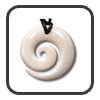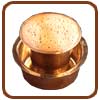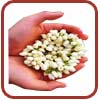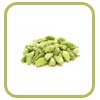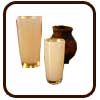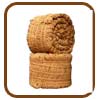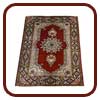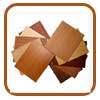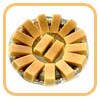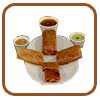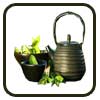 HISTORY OF KERALA COIR
HISTORY OF KERALA COIR
Kerala takes the pride of having the precious gift of coir or the golden fiber which is one of the very old traditional industries generating employment for thousands and thousands of people. There is lot of stories related to the birth of the golden fiber. The first mention of it in the history dates back to the period of Ramayana. Ramayana the historical epic was written by Valmiki during the 3rd century BC wich had made references of coconut in the Kishkindha Kanda and Aranya Kanda. So coconut and its associated product belong to the post Vedic period. Even in ancient period, coconut fiber in the form of ropes and cordage have been used by the people. Ship cables primarily made out of coir was used centuries ago by the Indian navigators who used to travel by sea to other countries like Malaya, Java, China and to the Gulf of Arabia.
 11th CENTURY MENTIONS OF THE USE OF COIR AS SHIP CABLES
11th CENTURY MENTIONS OF THE USE OF COIR AS SHIP CABLES
During the 11th century mentions of the use of coir as ship cables and fenders is seen in the Arab writings. Coir was also used for rigging. Even before the 2nd half of the 19th century there were existence of coir industry in UK. During the year 1840, Captain Widely, in co-operation with Captain Logan and Mr. Thomas Treloar, founded the well-known carpet firms of Treloar and Sons in Ludgate Hill, England for the manufacture of coir into various fabrics suitable for floor coverings. When we talk about the province of Kerala it goes without saying that coir is a part of the state and it dates back to the 19th century. Kerala one of the beautiful states in India is situated between the Western Ghats on the east and the Arabian Sea on the West. Kerala is a very small coastal territory with a tropical climate enriched with coconut palms and wide sandy beaches.
 KERALA - A CASCADE OF LUSH GREEN VEGETATION
KERALA - A CASCADE OF LUSH GREEN VEGETATION
Kerala slithers from the mountain Ghats in a cascade of lush green vegetation and varied geological atmosphere. Coconut is the most abundant tree found in Kerala because of its tropical climate. In fact the name Kerala is derived from the terms 'Kera' in Malayalam language means Coconut and 'Alam' means Land and thus the land of coconut, meaning Kerala. Not only the food of Kerala is based on coconut but also the culture of the people here is very much associated to coconut trees and it's related by products. The major centre for coir industry in Kerala is Alleppey more popularly known by the people of Kerala as Alappuzha. The Coir Industry is a standing monument of the toil of nearly 3.75 lakhs of workers with nearly 76% of them being the women folk, all the way from the outer husk to the golden yarn and then to the fabrics of coir and all that.
 HUSK OF THE COCONUT IS BEATEN INTO FIBER
HUSK OF THE COCONUT IS BEATEN INTO FIBER
The husk of the coconut is beaten into fiber and after which it undergoes various process to get the final product which may be either beautiful mats or other coir products. The majority of the workers are women who are mainly into yarn spinning sector and the men are into the weaving sector.
The largest cottage industry of Kerala is the coir industry and it gives employment for millions of people. The other main factor which contributed for the growth and the stability of the coir industry is the harbor located at Kochi which acts as a major trading centre.
The golden fiber is considered to be eco-friendly and also its 100% eco- friendly feature helps in encouraging and supporting the 'Go Green' movement and a Nature-friendly lifestyle.
 COIR OR COCOS PROUDLY KNOWN AS GOLDEN FIBER
COIR OR COCOS PROUDLY KNOWN AS GOLDEN FIBER
Coir or Cocos proudly known as golden fiber extracted from the husk of the coconut is spun into a breath-taking range of textured yarn and woven into a spectrum of colorful floor coverings. The process involves removal of the husk from the nuts which are soaked in water mainly in lagoons for a period of at least ten months and then they are beaten with a huge hammer with a wooden head which results in the golden fiber or the coir. This whole process is usually done manually. The fiber thus obtained is then spun into yarn on traditional spinning wheels called Ratts. Now the yarn which is ready goes for dyeing and weaving of multiple shades. There are different grades of coir yarns with distinct characteristics which are produced and are used for varying purposes like industrial, agricultural and domestic applications.
 COIR PRODUCTS ARE EXCEPTIONALLY FUNCTIONAL
COIR PRODUCTS ARE EXCEPTIONALLY FUNCTIONAL
Coir products that are exceptionally functional are virtually irreplaceable when it comes to economy, durability and beauty. Some of the specialties of the coir fiber are that they are moth- proof and are unaffected by fungi and rot. It also acts as an insulating agent against sound and temperature and is inflammable. Their quality of tough and durability helps the coir products to regain to shape even after continuous use. They are very stable and easy to clean. The highly comprehensive range of floor coverings, hardwearing door mats, durable mattings and rugs, crush-proof pile carpets, heavy flowered Mourzouks, etc. in a variety of dimensions enhance the elegance of the place of choice. Some of the main areas in Kerala which are into coir industries are Alappuzha, Kayamkulam, Chirayinkeezhu, Kollam, North Parur, Thrissur, Kozhikode, Kannur, Ponnani and Vaikom.
 COIR PRODUCTS OF KERALA ARE EXPORTED TO OTHER COUNTRIES
COIR PRODUCTS OF KERALA ARE EXPORTED TO OTHER COUNTRIES
The coir products of Kerala are exported to other countries like U.S.A, U.K, Germany, Netherlands, Italy and Belgium .Nearly 37% of the total export from Kerala is accounted by the United States and all the European countries put together constitute about 41% of the export items from the state. Netherland is the major market for coir yarn and coir pith and the coir handloom market is taken over by the United States. The master craftsmen of the province of Kerala use a magical wand to turn the rough and raw coir into number of beautiful and traditional products like rope, twine, brooms and brushes, doormats, rugs, mattresses and other upholstery. The byproduct of the coir industries, the coir pith and coco lawn is used in the manufacture of value added product. Coir pith the by-product of coir industry is used as a soil conditioner because it helps in absorbing and retaining water.
 COIR AND COIR PRODUCTS OF KERALA ARE SAID TO BE THE FINEST IN THE WORLD
COIR AND COIR PRODUCTS OF KERALA ARE SAID TO BE THE FINEST IN THE WORLD
Today, coir and coir products of Kerala are said to be the finest in the world. Following the worldwide shift toward eco-friendly products there is an increasing demand for the coir products of Kerala in the international market, especially in Africa, Latin America and Middle East.During the mid 19th century, the then Government of Travancore started the scheme of Co.operativisation in the coir industry. Since then the Government has been aiding the sectors with a helping hand for its growth by various means including welfare measures for the employees and lot of new schemes. But in spite of all the efforts taken by the government, the coir industry is still considered as a sick industry for there is no growth neither in the industry or the in the life style of the coir workers to the expected level. The coir industry is fighting for its revival and to survive for there is lot of competition from other industries dealing with synthetic fibers both in domestic and International Markets.
 COMPLICATIONS ASSOCIATED WITH NON-PROFESSIONALIZED MANAGEMENT SYSTEM OF THE INDUSTRY
COMPLICATIONS ASSOCIATED WITH NON-PROFESSIONALIZED MANAGEMENT SYSTEM OF THE INDUSTRY
many factors like issues and complications associated with non- professionalized management system in the Co-operative Sector, insufficiency in responsibility and sincerity of the Managing committees, union leaders not coming forward to new ideas of mechanization and modern technologies, elaborate use of tender coconut, attack of Mandri diseases to the coconut tree and thereby less production of husk, absence of any efficient system of uninterrupted collection or procurement of the available husk, over dependence on Governmental assistance, unhygienic surroundings and conditions of the work area of traditional retting and beating operations etc., are all responsible for the shortage of fiber and thereby decline in the fiber production.
All these factors led to unparalleled hike in the price of fiber leading to buying from elsewhere.
 SHORTAGE OF FIBER
SHORTAGE OF FIBER
In order to tide over this situation of shortage of fiber the government has made all arrangements to import coir from other countries just as a temporary measure and based on the economic growth and development whether it can be a continuing process or as and when required. Revival of the existing Defiberring Units in the Co-operative Sector and opening of more such units in the Private Sector are therefore to be done, to ensure continuous availability of fiber. Steps have already been put forth for setting up a National Coir Research and Management Institute to work on the Research and the Developmental activities in the coir sector with an idea to enhance the industry resulting in the production of more value-added and new design products at a reasonable but competitive price so as to retain both the domestic and the international market for the coir products. There are nearly 802 registered Co-operative Societies of which only 455 are now working.
 ONLY 21 OF THEM ARE RUNNING WITH PROFIT
ONLY 21 OF THEM ARE RUNNING WITH PROFIT
In this 455 units, only 21 of them are running with profit and the rest are just managing to run the show. Many societies are at the brink of liquidation. Not only the State Coir Corporation but also the Public Sector Undertaking is facing lot of trouble. Another main reason for the poor performance of the coir industries is the failure to produce innovative designs and more value-added items according to the taste of the modern buyers.
 DEALERS OF KERALA COIR
DEALERS OF KERALA COIR
| 1. Coir Board
Coir House, Mg Road,
Kochi, Kerala. Ph:
0484 235 1807
|
| 2. Kerala State Coir Corporation Ltd,
Ernakulam Bazar, Marine Drive
Kochi, Kerala. Ph:
0484 236 4232
|
| 3. Gundu Island Coir Products Co-Op Society,
297, Elamkunnapuzha, Elamkunnapuzha
Ernakulam, Kerala. Ph:
0484 249 2418
|
| 4. Namitha Stores,
Market Road, Angamaly, Angamaly
Ernakulam, Kerala. Ph:
0484 245 6050
|
| 5. Chaithanya Associations,
39/1806, Mg Road,
Kochi, Kerala. Ph:
0484 237 6733
|
| 6. K K Varghese Coir Merchant,
Kezhakumthalayil House, Udyogamandal
Kochi, Kerala. Ph:
0484 245 2223
|
| 7. Geetha Stores,
Perumbavoor H O
Kochi, Kerala. Ph:
0484 252 3002
|
 HISTORY OF KERALA COIR
HISTORY OF KERALA COIR 11th CENTURY MENTIONS OF THE USE OF COIR AS SHIP CABLES
11th CENTURY MENTIONS OF THE USE OF COIR AS SHIP CABLES KERALA - A CASCADE OF LUSH GREEN VEGETATION
KERALA - A CASCADE OF LUSH GREEN VEGETATION HUSK OF THE COCONUT IS BEATEN INTO FIBER
HUSK OF THE COCONUT IS BEATEN INTO FIBER
 COIR OR COCOS PROUDLY KNOWN AS GOLDEN FIBER
COIR OR COCOS PROUDLY KNOWN AS GOLDEN FIBER COIR PRODUCTS ARE EXCEPTIONALLY FUNCTIONAL
COIR PRODUCTS ARE EXCEPTIONALLY FUNCTIONAL
 COIR PRODUCTS OF KERALA ARE EXPORTED TO OTHER COUNTRIES
COIR PRODUCTS OF KERALA ARE EXPORTED TO OTHER COUNTRIES COIR AND COIR PRODUCTS OF KERALA ARE SAID TO BE THE FINEST IN THE WORLD
COIR AND COIR PRODUCTS OF KERALA ARE SAID TO BE THE FINEST IN THE WORLD COMPLICATIONS ASSOCIATED WITH NON-PROFESSIONALIZED MANAGEMENT SYSTEM OF THE INDUSTRY
COMPLICATIONS ASSOCIATED WITH NON-PROFESSIONALIZED MANAGEMENT SYSTEM OF THE INDUSTRY
 SHORTAGE OF FIBER
SHORTAGE OF FIBER ONLY 21 OF THEM ARE RUNNING WITH PROFIT
ONLY 21 OF THEM ARE RUNNING WITH PROFIT DEALERS OF KERALA COIR
DEALERS OF KERALA COIR




